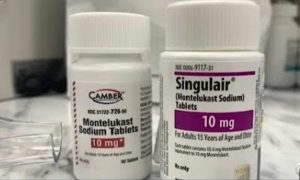In March 2020, the FDA issued a black box warning, commonly referred to as a boxed warning, regarding the mental health side effects associated with Singulair, also known by its generic name, montelukast—a medication with a 25-year history in treating asthma and allergies.
According to the National Institutes of Health (NIH), boxed warnings represent the highest level of safety-related alerts assigned by the FDA for medications.
This specific warning aimed to address longstanding concerns, spanning decades, related to issues such as aggression, agitation, and even suicidal thoughts associated with the drug. Although the FDA communicated this information to physician groups, it did not mandate that doctors undergo education on the potential side effects of the drug.
- California RESIDENTS To RECEIVE $500 MONTHLY PAYMENTS In New Guaranteed Income Program: Here Is Who Is Eligible
- Us Job Market Booms With 272,000 New Jobs, But Unemployment Rises Slightly To 4.0%
- Credit Scores Of 720+ See Improved Loan Rates This Week
- Examining The Facts: Fact Check On IRS $8700 Stimulus Check Eligibility & Payment Dates
- Gas Prices On Downward Trend As Fourth Of July Road Trips Approach: AAA
Despite the warning primarily being intended for physicians to convey to their patients, it appears that a minimal number of patients were actually informed about these potential risks.
The Rise and Alarm of Merck’s Singulair in the 2000s

Singulair, manufactured by the pharmaceutical giant Merck, experienced a notable surge in popularity during the early 2000s as a treatment for allergies and severe asthma, particularly among young children.
The mechanism of Singulair involves inhibiting the release of a chemical in the airways that can lead to swelling and excessive mucus production, posing a risk of airway blockage.
The drug’s popularity grew due to its perceived safety as an alternative to corticosteroid inhalers, which are more effective but cumbersome to carry.
Its availability in a child-friendly, cherry-flavored chewable pill contributed to its widespread use.
Concerns about potential links between Singulair and mental health problems prompted official alarms.
Data from healthcare analysis company Komodo Health, as reported by the New York Times, indicates that prescriptions have remained largely unchanged.
Approximately 12 million people filled at least one prescription in both 2019 and 2022.
While there has been a decrease in prescriptions for children, dropping from nearly 2 million in 2020 to around 1.6 million in the latest year, this still represents a substantial number.
Komodo Health’s data relies on Medicaid and Medicare claims, as well as submissions to private insurers.
Lack of Doctor Awareness on FDA Warnings for Singulair
Some experts express concern that many doctors may be unaware of the warnings issued by the FDA, which were communicated on the agency’s website.
Dr. Reshma Ramachandran, a family doctor at Yale University in Connecticut, advocates for more direct communication from the FDA to clinicians, suggesting potential mandatory retraining to ensure awareness of the associated risks.
The FDA has taken steps to alert medical professionals through email alerts, notifications to medical groups, and publication in a medical journal.
Pharmacists are mandated to distribute a medication guide containing the warning to patients, although concerns exist regarding patient compliance with reading these guides.
Several doctors attempting to transition patients to alternative drugs, such as zafirlukast, report facing resistance from patients who insist on returning to Singulair.
